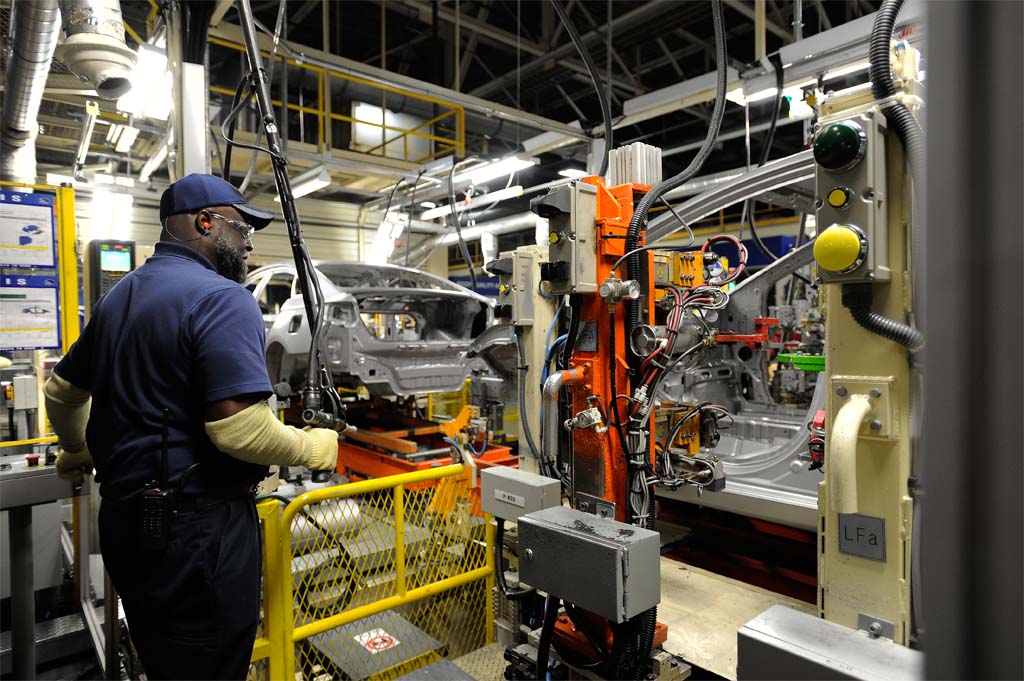A key supplier of body panels to Hyundai’s operations in Alabama has been hit with a $1.3 million fine for failing to follow basic safety procedures in the death of an employee.

The fine comes after Joon LLC — operating as Ajin USA — spent months battling OSHA over the citations following an investigation of how an employee at the company’s facility in Cusseta, Alabama suffered fatal injuries in June 2016 in a robotic machine.
A request for comment from Ajin went unanswered.
Numerous violations found
OSHA investigators determined the machine operator and three co-workers entered a robotic cell on the assembly line to clear a sensor fault when a robot inside the cell restarted abruptly, crushing a young woman inside, according to the U.S. Department of Labor.
An inspection led OSHA to cite Ajin USA for 51 safety violations, including 48 willful violations. On Feb. 10, an administrative law judge upheld the majority of the violations that OSHA issued.
“No violation or penalty can recover a life lost needlessly,” said U.S. Department of Labor Regional Solicitor Tremelle Howard in Atlanta in a statement this week.
“This case’s resolution serves as a stark reminder to all employers that the U.S. Department of Labor will exhaust all available resources and actions to hold them accountable when they fail to meet federal requirements to protect the safety and health of their employees.”
In a September 2020 criminal case, the U.S. District Court for the Middle District of Alabama, Eastern Division, ordered Ajin USA to pay a $500,000 fine and $1 million in restitution to the deceased woman’s estate after the company pleaded guilty to a charge of a willful violation of an OSHA standard.
The $1.3 million fine levied against Ajin USA, which has now been affirmed by the independent Occupational Safety and Health Review Commission, comes on top of the fines in the criminal case against the global auto parts supplier.
“Failing to lock out equipment causes far too many serious injuries and deaths,” explained OSHA Regional Administrator Kurt Petermeyer in Atlanta. “In this case, a young woman lost her life because her employer took shortcuts to minimize downtime and maintain production,” he said.
A lockout, which includes isolating energy sources, often is completed by putting padlock on the switches that turn a machine or network of machines such as presses, on and off. It also making sure the energy is drained from the system so it cannot set the equipment or part of machine in motion while it is being inspected or repaired, according to Rockwell Automation.
Scrutiny of supply base in Alabama increases
Based in South Korea, Ajin USA is a global supplier of parts to Hyundai and Kia with manufacturing plants in the U.S., South Korea, China and Vietnam. At the time of the incident, the manufacturer employed approximately 700 workers at its plant in Cusseta, Alabama.
At plants owned by Ajin in the east Alabama town of Cusseta, a former production engineer told Reuters he worked with at least 10 minors. And six other ex-employees of Ajin said they, too, worked alongside multiple underage laborers.
The information follows an earlier Reuters report in July that revealed the use of child workers, one as young as 12 years old, by SMART Alabama LLC, a Hyundai subsidiary in the south Alabama town of Luverne. In August, the U.S. Department of Labor said that SL Alabama LLC, another Hyundai supplier and a unit of South Korea’s SL Corp, employed underage workers, including a 13-year-old, at its factory in Alexander City.
Since then, as many as 10 Alabama plants that supply parts to Hyundai or Kia have been investigated for child labor by various state and federal law enforcement or regulatory agencies, according to two people familiar with the probes.
The probe into the practices of suppliers, which the South Korean automakers encouraged to set up shop in Alabama, has put Hyundai on the defensive.
“Our investigation remains ongoing, and we are working with authorities in their inquiry of this matter. Hyundai is committed to its suppliers who comply with the long-standing federal, state, and local labor laws and will not hesitate to move to sever its relationship with any supplier found violating our stringent policies,” a Hyundai spokesman said in a recent statement to newspapers in Alabama.








The 12 and 13 year old kids were probably the only people in Alabama able to program the robots.